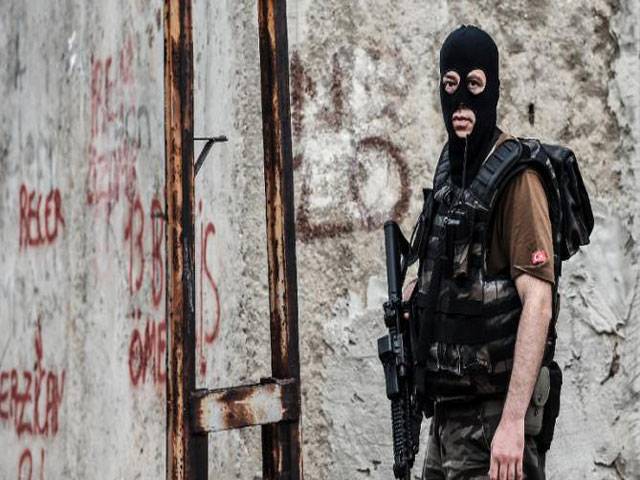ISTANBUL - Turkish prosecutors said Monday that police had discovered suicide vests, Kalashnikovs and hand grenades during searches of homes and vehicles belonging to suspects in the Ankara bombing that left 102 people dead.
“A Ford Focus car used in the Ankara attack has been found, as well as 11 suicide vests, six Kalashnikovs, 22 hand grenades, 1,683 bullets and hundreds of kilograms (pounds) of explosives,” prosecutors said in a statement.
Four people were remanded in custody over the October 10 attack - the worst of its kind in Turkey’s history - as the identity of one of the two suicide bombers involved was revealed. The suspects, who went before a judge on Sunday night, were charged with making “explosive devices with the intention to kill” and “an attempt to disrupt constitutional order”, Anatolia news agency said.
Prosecutors meanwhile issued arrest warrants for nine others accused of playing a part in the bombings.
Turkish authorities have said the Islamic State (IS) group is the “number one suspect” for the attacks which targeted a pro-Kurdish and liberal peace rally calling for an end to hostilities between security forces and Kurdish rebels.
Prime Minister Ahmet Davutoglu confirmed Monday that one of the suicide bombers had been officially identified through DNA testing, with prosecutors naming him as Yunus Emre Alagoz.
Alagoz, a young Turk from the Islamist militant stronghold of Adiyaman, was the brother of the man suspected of carrying out a similar attack in July in Suruc, a town in southern Turkey on the border with Syria, that killed 34 people, prosecutors said.
“One of the suicide bombers has been identified as Yunus Emre Alagoz. The other suicide bomber has been identified through photographs and efforts are going on to reveal his full identity,” the prosecutors’ statement said.
They added that Alagoz, believed to have trained with IS jihadists in Syria, had travelled “from a neighbouring country on our southern borders in order to carry out the attack”.
Turkish media had earlier identified the second bomber as Omer Deniz Dundar, who had twice been to Syria.
Davutoglu said the government was exploring ties between attacks on Suruc, Ankara and Diyarbakir.
Five people were killed in Diyarbakir in June after a bomb exploded during a pre-election campaign rally for the pro-Kurdish Peoples’ Democratic Party (HDP). One man was arrested for involvement in that attack.
A total of 768 people have been arrested over suspected links to IS since the Suruc attack in July, the prime minister said, pledging to track down those responsible for the latest atrocity.
Many of those arrested have since been released.
The four remanded in custody on Sunday were part of a group originally detained due to suspicious posts on Twitter.
Davutoglu, head of the Islamic-rooted AKP ruling party, said he believed “groups like Daesh, the PKK and DHKP-C... are working hand in hand to harm Turkey and drag it into chaos,” referring to IS, the outlawed Kurdistan Workers’ Party and the far-left Revolutionary People’s Liberation Party-Front.
Police on Sunday arrested some 50 foreign nationals in a sweep targeting suspected IS jihadists with alleged links to the bombings.
Turkey is the main point of entry to Syria for IS recruits.
The Ankara attack has raised political tensions to new highs as Turkey prepares for a snap election on November 1, in a country that has become more polarised than ever.
Pressure has piled on President Recep Tayyip Erdogan, with opposition figures blaming him for security lapses over the Ankara bombing and failing to crack down on IS.
Friday, April 19, 2024
Hoard of suicide vests, guns found in Ankara

8:27 AM | April 19, 2024
8:09 AM | April 19, 2024
Opposition objects to oath-taking of MNAs amid lawlessness
5:15 PM | April 19, 2024
Electioneering to end on Friday night ahead of by-polls in 21 constituencies
5:14 PM | April 19, 2024
Fawad Chaudhry granted bail in 14 cases related to May 9 violence
5:13 PM | April 19, 2024
British Army chief lauds Pakistan Army's professionalism, expertise
5:12 PM | April 19, 2024
Israeli aircraft fire missiles at Air Force assets in Iran: Report
3:52 PM | April 19, 2024
A Tense Neighbourhood
April 19, 2024
Dubai Underwater
April 19, 2024
X Debate Continues
April 19, 2024
Hepatitis Challenge
April 18, 2024
IMF Predictions
April 18, 2024
Kite tragedy
April 19, 2024
Discipline dilemma
April 19, 2024
Urgent plea
April 19, 2024
Justice denied
April 18, 2024
AI dilemmas unveiled
April 18, 2024
ePaper - Nawaiwaqt
Advertisement
Nawaiwaqt Group | Copyright © 2024





